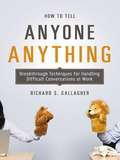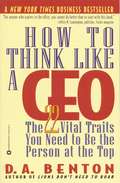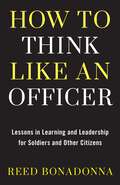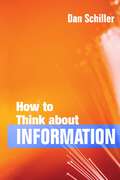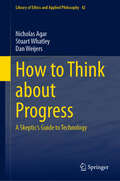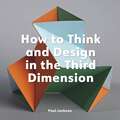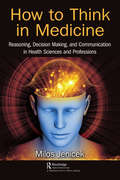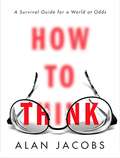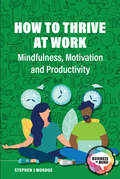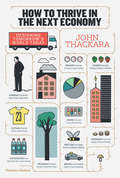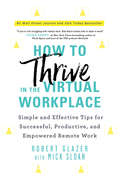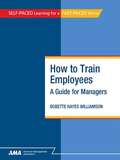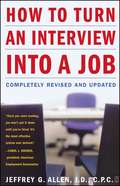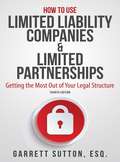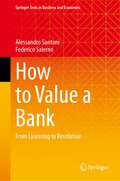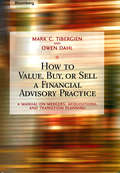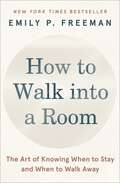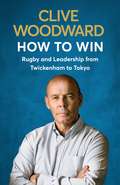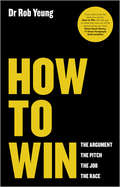- Table View
- List View
How to Tell Anyone Anything: Breakthrough Techniques for Handling Difficult Conversations at Work
by Richard GallagherNo one likes to be criticized, but this book teaches the communication skills needed to successfully get the message across while keeping feelings and relationships intact.Drawing from the latest in psychology on how best to connect with others, How to Tell Anyone Anything steers you away from the common mistake of providing feedback by focusing on what&’s wrong and shows you instead how to provide clear, constructive positive messages that create real behavior and performance change.You&’ll learn how to:be more candid,prioritize relationships,ask important questions,reframe difficult messages,control your emotions,and be graceful when you&’re on the receiving end of difficult feedback.Complete with illuminating examples and a unique step-by-step process, How to Tell Anyone Anything gives you powerful insight into how we all react naturally to criticism--and how to transform interactions that might become verbal tugs-of-war into collaborative problem-solving sessions.
How to Think Deeply: A Brief Guide to Overcoming Your Depth Deficit
by Gerald Zaltman Lindsay ZaltmanThis chapter identifies a deficit in deep thinking among managers and discusses some factors contributing to this deficit, particularly managers' tendencies to overemphasize surface-level differences among consumers and to neglect the deep metaphors that enable us to observe such differences in the first place.
How to Think Like a CEO: The 22 Vital Traits You Need to Be the Person at the Top
by D. A. BentonDrawing on in-depth interviews with hundreds of the nation's top executives, D. A. Benton explains the 22 vital traits that make a CEO - the leader responsible for making decisions, guiding teams, selling ideas, managing crises, and conquering the mountains before them. You'll penetrate the mystery of why some people make it to the top and some don't, when they're all equally good at their jobs. You'll learn how to avoid getting fired and how to get promoted more quickly, how to enjoy the quality of life you want and deserve, and - if you decide you want to be the Big Boss - how to have the right character traits to get there. These are some of the traits that make a CEO. Are you ready to make them yours? You're gutsy and a little wild - yet modest and in control. You're competitive and tenacious - yet flexible and generous. You're willing to admit mistakes - yet unapologetic. You're secure in yourself - yet constantly improving. You're original and straightforward - yet think before you talk. Make your ascent not only gratifying, but also exhilarating and fun. This is how chiefs run the show - and how you can act like a chief to become a chief, even sooner than you dreamed.
How to Think Like an Officer: Lessons in Learning and Leadership for Soldiers and Citizens
by Reed BonadonnaThe U.S. military invests heavily in time and resources to train its officers to be leaders in the broadest sense – forming them not only in military art and science (strategy, tactics, command, etc.), but also in humanistic knowledge, character, and values, as well as how to apply this education on a lightning-fast battlefield or within an inertially slow bureaucracy. The military develops its leaders, at the service academies and in ROTC programs, through very specific but also broad and deep education – a way of thinking that also has wide application in the civilian world, not only in various professional fields that need leaders and thinkers, but also among military history enthusiasts who want to understand how officers have thought across time and among American citizens who want – and, really, need – to understand how our military leaders think, how they advise presidents, how they lead on the battlefield.In a genre-busting book that spans Stackpole&’s two longstanding military programs – reference and history – Reed Bonadonna describes how officers think, how they ought to think, how they develop their skills, and how they can improve these skills, as well as how average civilians and citizens can learn from the example of military officers and their program of education. Bonadonna draws from military history, from military arts and science, from literature and science and more, to show how officers develop their critical-thinking and problem-solving skills. A military officer is often called upon to be not only fighter and leader, but also negotiator, organizer, planner and preparer, teacher, writer, scientist, and advisor, and needs broad learning. This is a deeply learned and insightful book, one that cites Lincoln, Grant, Patton, Eisenhower, Marshall, and Churchill as easily as Sun Tzu and Clausewitz, not to mention Homer, Plato, Joseph Conrad, Henry James, Wilfred Owen, Robert Graves, George Orwell, Ludwig Wittgenstein, Joseph Heller, Phil Klay, and even Jane Austen. The book is descriptive as well as prescriptive and should find eager readers inside the military (where officers take seriously their professional education and their professional reading lists) as well as outside, where many look to the military, to military reading lists, and to military history, to glean lessons for life and work.
How to Think about Information
by Dan SchillerIt is common wisdom that the U.S. economy has adapted to losses in its manufacturing base because of the booming information sector, with high-paying jobs for everything from wireless networks to video games. We are told we live in the Information Age, in which communications networks and media and information services drive the larger economy. While the Information Age may have looked sunny in the beginning, as it has developed it looks increasingly ominous: its economy and benefits grow more and more centralized--and in the United States, it has become less and less subject to democratic oversight. Corporations around the world have identified the value of information and are now seeking to control its production, transmission, and consumption. In How to Think about Information, Dan Schiller explores the ways information has been increasingly commodified as a result and how it both resembles and differs from other commodities. Through a linked series of theoretical, historical, and contemporary studies, Schiller reveals this commodification as both dynamic and expansionary, but also deeply conflicted and uncertain. He examines the transformative political and economic changes occurring throughout the informational realm and analyzes key dimensions of the process, including the buildup of new technological platforms, the growth of a transnationalizing culture industry, and the role played by China as it reinserts itself into an informationalized capitalism.
How to Think about Progress: A Skeptic's Guide to Technology (Library of Ethics and Applied Philosophy #42)
by Nicholas Agar Stuart Whatley Dan WeijersHow to Think about Progress is an interdisciplinary work exploring whether optimistic claims about technology’s potential stand up to humanity’s most difficult challenges. Will technology solve the problems of climate change, pandemics, cancer, loneliness, unhappiness, and even death? The authors show that techno-hype is all too often accepted because of the horizon bias, i.e. the modern propensity to believe that any problem that can be solved with technology will be solved in the very near future. The authors situate their analysis in a broad context, drawing on history, literature, and popular culture to emphasize their case against techno-hype. They also draw on a wide range of research, including that of biologists, philosophers of science and of language, psychologists, theorists of technological change, specialists on digital technologies, historians of ideas, and economists. As a corrective to much mainstream “futurism,” the book offers principles for seeing through much of the techno-hype that circulates online and in best-selling books. The authors share insights (without the jargon) from a variety of academic disciplines, making this book an engaging read for all audiences. Readers will find a balanced framework for thinking and writing about technological progress in the face of truly vexing challenges like cancer, climate change, and colonizing mars.
How to Think and Design in the Third Dimension
by Paul JacksonFrom paper folding genius Paul Jackson comes his latest book How to Think and Design in the Third Dimension. We live in a 3-D world, but most three-dimensional objects are designed from a series of two-dimensional side elevations and plan views. This book will teach you how to think and design in the third dimension. Through 60 construction projects, you will learn how folded paper units can be joined to create beautiful 3-D structures, according to the principles of three-dimensional symmetry. In addition to over 80 specially commissioned photographs and 300 step-by-step illustrations, this accessible book contains QR codes or hyperlinks to 30 short videos that show a selection of the projects rotating through 360 degrees.With How to Think and Design in the Third Dimension by their side, anyone who creates in three dimensions, including designers of all specialities, sculptors, architects, engineers and craftspeople, will be able to design with a new, practical and infinitely creative language of form.
How to Think and Design in the Third Dimension
by Paul JacksonFrom paper folding genius Paul Jackson comes his latest book How to Think and Design in the Third Dimension. We live in a 3-D world, but most three-dimensional objects are designed from a series of two-dimensional side elevations and plan views. This book will teach you how to think and design in the third dimension. Through 60 construction projects, you will learn how folded paper units can be joined to create beautiful 3-D structures, according to the principles of three-dimensional symmetry. In addition to over 80 specially commissioned photographs and 300 step-by-step illustrations, this accessible book contains QR codes or hyperlinks to 30 short videos that show a selection of the projects rotating through 360 degrees.With How to Think and Design in the Third Dimension by their side, anyone who creates in three dimensions, including designers of all specialities, sculptors, architects, engineers and craftspeople, will be able to design with a new, practical and infinitely creative language of form.
How to Think in Medicine: Reasoning, Decision Making, and Communication in Health Sciences and Professions
by Milos JenicekMastery of quality health care and patient safety begins as soon as we open the hospital doors for the first time and start acquiring practical experience. The acquisition of such experience includes much more than the development of sensorimotor skills and basic knowledge of sciences. It relies on effective reason, decision making, and communication shared by all health professionals, including physicians, nurses, dentists, pharmacists, and administrators. How to Think in Medicine, Reasoning, Decision Making, and Communications in Health Sciences is about these essential skills. It describes how physicians and health professionals reason, make decision, and practice medicine. Covering the basic considerations related to clinical and caregiver reasoning, it lays out a roadmap to help those new to health care as well as seasoned veterans overcome the complexities of working for the well-being of those who trust us with their physical and mental health. This book provides a step-by-step breakdown of the reasoning process for clinical work and clinical care. It examines both the general and medical ways of thinking, reasoning, argumentation, fact finding, and using evidence. It explores the principles of formal logic as applied to clinical problems and the use of evidence in logical reasoning. In addition to outline the fundamentals of decision making, it integrates coverage of clinical reasoning risk assessment, diagnosis, treatment, and prognosis in evidence-based medicine. Presented in four sections, this book discusses the history and position of the problem and the challenge of medical thinking; provides the philosophy interfacing topics of interest for health sciences professionals including the probabilities, uncertainties, risks, and other quantifications in health by steps of clinical work; decision making in clinical and community health care, research, and practice; Communication in clinical and community care including how to write medical articles, clinical case studies and case reporting, and oral and written communication in clinical and community practice and care.
How to Think: A Survival Guide for a World at Odds
by Alan Jacobs"Absolutely splendid . . . essential for understanding why there is so much bad thinking in political life right now." —David Brooks, New York TimesHow to Think is a contrarian treatise on why we’re not as good at thinking as we assume—but how recovering this lost art can rescue our inner lives from the chaos of modern life. As a celebrated cultural critic and a writer for national publications like The Atlantic and Harper’s, Alan Jacobs has spent his adult life belonging to communities that often clash in America’s culture wars. And in his years of confronting the big issues that divide us—political, social, religious—Jacobs has learned that many of our fiercest disputes occur not because we’re doomed to be divided, but because the people involved simply aren’t thinking. Most of us don’t want to think. Thinking is trouble. Thinking can force us out of familiar, comforting habits, and it can complicate our relationships with like-minded friends. Finally, thinking is slow, and that’s a problem when our habits of consuming information (mostly online) leave us lost in the spin cycle of social media, partisan bickering, and confirmation bias. In this smart, endlessly entertaining book, Jacobs diagnoses the many forces that act on us to prevent thinking—forces that have only worsened in the age of Twitter, “alternative facts,” and information overload—and he also dispels the many myths we hold about what it means to think well. (For example: It’s impossible to “think for yourself.”) Drawing on sources as far-flung as novelist Marilynne Robinson, basketball legend Wilt Chamberlain, British philosopher John Stuart Mill, and Christian theologian C.S. Lewis, Jacobs digs into the nuts and bolts of the cognitive process, offering hope that each of us can reclaim our mental lives from the impediments that plague us all. Because if we can learn to think together, maybe we can learn to live together, too.
How to Thrive at Work: Mindfulness, Motivation and Productivity (Business in Mind)
by Stephen J MordueAn essential read for anyone experiencing low level anxiety or stress, this book pulls together the various individual strands of business logic, scientific research, self-care, spirituality and common sense to provide a one-stop guide to thriving at work.The widespread ‘more for less’ attitude is creating a dramatic rise in work-related stress and a higher ratio of staff sickness. Not only does this create a fiscal impact upon the organisation and the broader economy but it has the potential to create significant long-term mental health issues for employees.You cannot always alter the demands of your professional or personal lives but, by understanding more about how your brain functions and by actively pursuing well-being techniques, you can enhance the skills that help you manage and succeed at the challenges thrown at you and reduce the risks associated with burnout.With a focus on improving mindfulness, motivation and productivity, this book offers sound, practical advice and strategies for self-care whatever your working environment and whatever stage you are at in your career.
How to Thrive in the Next Economy: Designing Tomorrow's World Today
by John ThackaraA visionary yet practical guide to building a more sustainable future, by one of the most important voices in environmentally aware design Are there practical solutions to the many global challenges—climate change, poverty, insufficient healthcare—that threaten our way of life? Author John Thackara has spent a lifetime roving the globe in search of design that serves human needs. In this clear-eyed but ultimately optimistic book, he argues that, in our eagerness to find big technological solutions, we have all too often ignored the astonishing creativity generated when people work together and in harmony with the world around them. Drawing on an inspiring range of examples, from a temple-led water management system in Bali that dates back hundreds of years to an innovative e-bike collective in Vienna, Thackara shows that below the radar of the mainstream media there are global communities creating a replacement economy—one that nurtures the earth and its inhabitants rather than jeopardizing its future—from the ground up. Each chapter is devoted to a concern all humans share—land and water management, housing, what we eat, what we wear, our health, how and why we travel—and demonstrates that it is possible to live a rich and fulfilling life based on stewardship rather than exploitation of the natural environment.
How to Thrive in the Virtual Workplace: Simple and Effective Tips for Successful, Productive, and Empowered Remote Work
by Robert GlazerThe remote work revolution has been rapidly accelerated by the COVID-19 pandemic. Organizations as big as Twitter have learned their employees didn't need an office to get great results, and employees are using the flexibility of remote work to live where they want, ditch their commutes and live a work-life integration that works for them.Remote work is here to stay, and the companies that do it well will have a clear competitive advantage in the future. As founder and CEO of Acceleration Partners, a 100 percent remote organization with 170 employees who work from home, Robert Glazer has discovered that with the right principles, tactics and tools for managing remote employees, many businesses can excel in a virtual world. In this highly actionable book, Glazer shares how he and his team built a remote organization that has been recognized with dozens of awards for its industry performance and company culture.How to Thrive in the Virtual Workplace shares insights from the remote employee, manager and leader perspectives, offering a blueprint any person can use to make remote work successful, productive and fulfilling. Learn how to leverage the flexibility of remote work, be more productive while working at home, avoid burnout, lead a team of virtual employees and build an organization that sets the gold standard for virtual work.The remote work revolution is here—the leaders who will build the future are the ones who can lead top performing virtual teams. Learn how to build a world-class organization—office no longer required.
How to Train Employees: A Guide for Managers
by Bobette Hayes WilliamsonAssess, design, deliver, and evaluate training that is right for every employee. As the global marketplace expands, the need for a flexible, well-trained workforce grows with it. Training employees to master business-critical skills has become a baseline requirement for managerial success. This book provides the tools and techniques to assess, design, deliver and evaluate training that is right for every employee. Based on a four-part training process, this book provides cases, exercises, worksheets and planning forms that make the learning immediate and dynamic and allow you to assemble the elements of your own training programs as you progress through the course. You will learn how to: • Link training to short-term job requirements and the strategic needs of the business • Collaborate effectively with training professionals before, during, and after training • Determine the training needs of your employees • Describe training objectives and measures • Design a training program and create and use lesson plans for dynamic instruction • Apply proven principles of adult learning throughout the training process • Present both on-the-job and classroom training • Support the transfer of learning from the training session back to the job • Evaluate the effectiveness of training
How to Turn $100 into $1,000,000: Earn! Save! Invest!
by James McKenna Jeannine Glista Matt FontaineFrom the creators of Biz Kid$ and Bill Nye the Science Guy, here is a comprehensive guide for kids to the basics of earning, saving, spending, and investing money. Written in a humorous but informative voice that engages young readers, it’s the book that every parent who wants to raise financially savvy and unspoiled children should buy for their kids. It is packed with lively illustrations to make difficult concepts easy to understand—all as a way of building financial literacy, good decision-making, and the appreciation of a hard-earned dollar.
How to Turn Down a Billion Dollars: The Snapchat Story
by Billy Gallagher"In the grand tradition of Ben Mezrich's The Accidental Billionaires (2009)... an engaging look into a fascinating subculture of millions." —Booklist"Breezy...How to Turn Down a Billion Dollars ably if uncritically chronicles the short history of a young company catering to young users, with a young chief executive, and reveals, intentionally or not, the limitations that come with that combination." —Wall Street JournalThe improbable and exhilarating story of the rise of Snapchat from a frat boy fantasy to a multi-billion dollar internet unicorn that has dramatically changed the way we communicate.In 2013 Evan Spiegel, the brash CEO of the social network Snapchat, and his co-founder Bobby Murphy stunned the press when they walked away from a three-billion-dollar offer from Facebook: how could an app teenagers use to text dirty photos dream of a higher valuation? Was this hubris, or genius? In How to Turn Down a Billion Dollars, tech journalist Billy Gallagher takes us inside the rise of one of Silicon Valley's hottest start-ups. Snapchat developed from a simple wish for disappearing pictures as Stanford junior Reggie Brown nursed regrets about photos he had sent. After an epic feud between best friends, Brown lost his stake in the company, while Spiegel has gone on to make a name for himself as a visionary—if ruthless—CEO worth billions, linked to celebrities like Taylor Swift and his wife, Miranda Kerr. A fellow Stanford undergrad and fraternity brother of the company’s founding trio, Gallagher has covered Snapchat from the start. He brings unique access to a company Bloomberg Business called “a cipher in the Silicon Valley technology community.” Gallagher offers insight into challenges Snapchat faces as it transitions from a playful app to one of the tech industry’s preeminent public companies. In the tradition of great business narratives, How to Turn Down a Billion Dollars offers the definitive account of a company whose goal is no less than to remake the future of entertainment.
How to Turn On the Charm: Building Influence Through Real Human Interactions for a Change
by Jeffrey PfefferThis chapter provides some important lessons in building and exercising influence by treating people with courtesy and respect.
How to Turn an Interview into a Job
by Jeffrey G. AllenA completely revised and updated edition of the bestselling, classic how-to on mastering the art of the interview Getting and winning the interview is the key to being hired. Everything else -- research, resumes, e-mails, phone calls -- is all backup for that crucial meeting. In How to Turn an Interview into a Job, America's leading interview authority, Jeffrey Allen, presents proven advice on the A to Zs of successful interviewing. Incorporating current etiquette and the new work ethic, Allen covers every step of the process, including: Making the initial phone calls Scheduling appointments Selecting an interview wardrobe How to have the toughest interviewer extend an offer The follow-up letter Maximum salary negotiation This new edition for the twenty-first century is also packed with ways to maximize current technology such as fax machines, voicemail, e-mail, and the Internet. For every kind of job seeker, How to Turn an Interview into a Job remains the simplest, most practical, and most streetwise guide to the fastest hire.
How to Use Limited Liability Companies and Limited Partnerships: Getting the Most Out of Your Legal Structure
by Garrett SuttonDesigned for entrepreneurs and individuals interested in starting their own business, this book provides an indepth study of how the special characteristics of limited partnerships and limited liability companies may be used to your advantage and to assist you in protecting assets, managing wealth and strategic estate planning to minimize taxes. It features strategic uses of limited liability companies and limited partnerships to hold real estate and other assets, how to easily manage and operate a limited liability company or limited partnership, how to creatively plan for your future and your family's future, and how to follow the rules to keep your assets protected.
How to Value a Bank: From Licensing to Resolution (Springer Texts in Business and Economics)
by Alessandro Santoni Federico SalernoThis book gives an overview of the most common techniques used by analysts and experts to assess and value banks in all phases of a Bank’s life, from licensing to resolution. These include licensing procedures, going concern market valuation techniques, liquidation, and resolution methodologies. The author sheds light on financial institutions’ reporting and financial statements and explains how to interpret the data. Special attention is given to the different valuation approaches for financial institutions ranging from the basic PE and PBV methodologies to the more sophisticated ones such Discount cash flow (DCF), Dividend discount model (DDM), excess return models (EVA), and their variant, the warranted equity value (WEV) method. The authors also illustrate how to build a sum-of-the-parts model (SOTP) and how to treat capital in the process as well as developing a bottom-up approach for the cost of equity. The book provides numerous real-world examples which will hopefully help practitioners build their own MS Excel models. Furthermore, this publication investigates some of the critical aspects of banking M&A and its valuation implications. This book also takes a deep dive into valuation for Banks in gone concern status, describing the basis for three different types of valuation of Banks in resolution: to inform a decision on whether to put a bank into resolution; to inform the choice of resolution tools and the extent of any bail-in of liabilities; and to determine whether any creditors would have been better off had the bank gone into insolvency. Special attention is given to the valuation of non-performing loans (NPLs) and financial assets focusing on some operational aspects of winding-down a bank’s loan and trading book portfolio.
How to Value, Buy, or Sell a Financial Advisory Practice: A Manual on Mergers, Acquisitions, and Transition Planning (Bloomberg Financial #58)
by Mark C. Tibergien Owen DahlFinancial planning is a young industry. The International Association of Financial Planning—one of the predecessors to the Financial Planning Association—was formed less than forty years ago. But as the profession's first tier of advisers reaches maturity, the decisions that may be part of transition planning for their firms loom large. A sale? A partner buyout? A merger? No matter what the choice, its viability hinges on one critical issue—the value of the firm. Unfortunately, many advisers--whether veteran or novice—simply don't know the worth of their practice or how to influence it. That's why How to Value, Buy, or Sell a Financial-Advisory Practice is such an important book. It takes advisers carefully through the logic and the legwork of coming to a true assessment of one of their most important personal assets—their business. Renowned for their years of experience helping advisers tackle the daunting challenges related to the valuation, sale, and purchase of advisory firms, Mark C. Tibergien and Owen Dahl offer guidance that's essential and solutions that work.
How to Walk into a Room: The Art of Knowing When to Stay and When to Walk Away
by Emily P. FreemanIf life were a house, then every room holds a story. What do we do when a room we’re in is no longer a room where we belong?What do you do when you start to feel a shift and must decide if it’s time to make a change? When it comes to navigating big decisions about when to stay and go, how can we know for sure when the time is right? Though we enter and exit many rooms over the course of our life—jobs, relationships, communities, life stages—knowing how and when it’s time to leave is a decision that rarely has a clear answer.Podcast host, spiritual director, and bestselling author of The Next Right Thing, Emily P. Freeman offers guidance to help us recognize when it’s time to move on from situations that no longer fit, allowing us to find new spaces where we can flourish and grow.How to Walk Into a Room helps us begin to uncover the silent, nuanced, and hidden arrows for anyone asking questions like: How do I know if it’s time to move on? What if I stay and nothing changes? What if I leave and everything falls apart?Through thought-provoking questions, spiritual practices, and personal stories, How to Walk into a Room will help you to know and name the caution flags in your current spaces, discern the difference between true peace and discomfort avoidance, navigate endings even when there is no closure, find peace for when you feel ready but it isn’t time, and courage for when it’s time but you don’t feel ready. For anyone standing in a threshold, here’s a book to help discern the how, when, and what now of walking out of rooms and into new ones with peace, confidence, and a whole heart.
How to Wholesale Houses for Huge Cash Part 2: With Contracts Included
by Ernie Braveboy<p>This book is a step by step guide to closing your first real estate without needing any of your own money or credit. In this book i give you all the tools to close your first real estate deal . would you like to make $5000 per deal without using your cash or credit. This book aims to guide you through the process of becoming financially free through real estate investing. <p>This was written for people who are fed up with the traditional "rat race" style of living and want to create a new way of living no matter if you have never been involved in real estate or have any money of your own. This book will guide your mind and actions to building massive wealth step by step. If you want to make thousands of dollars per month you need this book. Anyone can build financial freedom by changing his or her mindsets and improving his or her daily habits. This book will change the way that you think about money and the way you think about the opportunity surrounding you each and every day. This book will inspire you to begin your own real estate business and provide a living for your family that you only dreamed of get started today and make money like top 1% wholesaling houses without using your cash or credit.</p>
How to Win
by Clive WoodwardIn his entertaining and informative new book, Sir Clive Woodward analyses the events of the 2019 Rugby World Cup, offering his unique perspective on the performance of players and coaches, from Owen Farrell and Kieran Read, to Eddie Jones and Steve Hansen.HOW TO WIN:Rugby and Leadership from Twickenham to Tokyo is much more than the story of a tournament, however. It is the distillation of a philosophy of leadership developed during a lifetime in high-performance environments, from the rugby field to the boardroom. Tapping into his experience of winning the 2003 World Cup, being a part of the leadership team that delivered Olympic Success in 2012 and lessons drawn from Japan 2019, the author delivers a go-to manual in how to improve both individual and team performance in order to reach the pinnacle in sport and in business.Every individual position in rugby requires a unique set of skills, knowledge and expertise that collectively form a balanced team; the same is true in any successful business or organisation. From 1 to 15, the former England and British and Irish Lions coach identifies the key attributes and uses these defining traits to explain his collaborative 'Teamship' leadership style.With a fascinating blend of analysis, insight and anecdote, and the highs and lows of a memorable Rugby World Cup as the setting, Clive reveals how to lead the culture of a winning team - in any context.
How to Win
by Rob YeungNever come second place againSay goodbye to feelings of inadequacy - never again will you have to look on while someone else gets that promotion you wanted, wins the pitch you went for or beats you on the playing field. Bid farewell to that sense of jealously when someone else comes out on top, or that frustration when someone argues your socks off and leaves you defeated. Now you can be the winner.Psychologist and bestselling author Dr Rob Yeung will show you how to triumph when it really counts. How to gain the competitive advantage and come first more often. How to win arguments, negotiations, pitches, job interviews and more. Based on the latest research and proven psychological principles, Rob explains the science behind winning and how you can apply them to all facets of your life.If you're not winning, you're losing. Don't be a loser. Learn to win."If you want to be the best you can be, How to Win will help you to make the most out of the opportunities you have." Dame Sarah Storey, 11-times Paralympic Gold medallist"Fun to read, strong on evidence and full of useful techniques - an ideal book for those wanting to get into 1st place." Dr. Sebastian Bailey, co-founder and President, Mind Gym "Rob's advice is practical, to the point and above all effective. Another must-read - and must-do!" Julian Ranger, Founder & Chairman, SocialSafe"This book is a winner in every respect. Evidence-based advice in a well-constructed, highly-readable and easily recalled format. What's stopping you being a winner? Perhaps it's the fact you've yet to read Rob Yeung's excellent book." Robert Kelsey, author of What's Stopping You? and What's Stopping You Being More Confident?"How to Win provides practical information to people on getting ahead in their career, the soft skills necessary to be successful at work, from networking to being more assertive to using political skills. This is a must read for anyone wanting to succeed in their jobs and careers." Professor Cary L. Cooper, CBE, Distinguished Professor of Organizational Psychology and Health at Lancaster University Management School"Inspirational but with practical tips - a must read whether you're starting out or an experienced professional." Carol-Ann White, Global Human Resources Director, branding consultancy FITCH"How to Win is a great blend of compassion and practical experience. Dr Rob Yeung provides simple and logical steps to making a difference and wraps each one in stories and examples that speak to everyone. This book will make you rethink your approach to every situation and applying the ideas will change your life and performance at work in a very positive way. Highly recommended." Gary White, Chief Executive, sales technology company White Springs
